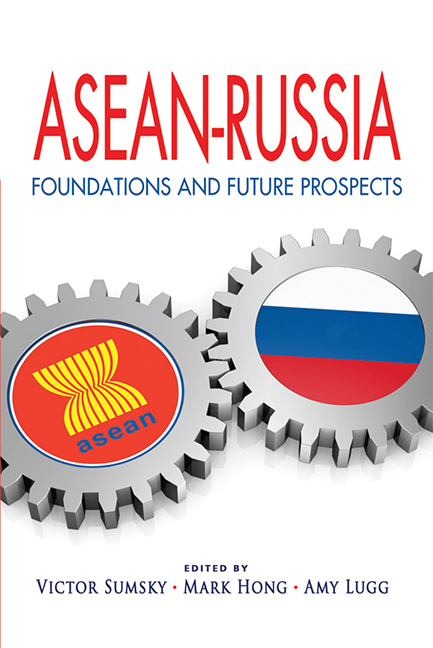Book contents
- Frontmatter
- Contents
- Foreword
- Preface
- About the Contributors
- Keynote Address
- Opening Remarks
- Keynote Address
- Introduction: Russia and the ASEAN Member States: Political and Economic Cooperation in Progress
- SECTION I WISEMEN'S VIEWS
- SECTION II GEOPOLITICS
- Russia in Southeast Asia: A New “Asian Moment”?
- ASEAN-Russia Military Ties: Reconfiguring Relations
- The Enlargement of the East Asia Summit: The Reasons and Implications of Bringing Russia In
- Russia's Entry into ASEM: Not Just a Courtesy Call?
- Russia-India-China: Acting in Concert in Southeast Asia?
- The South China Sea Issue: A View from Russia
- Southeast Asia and Russia: Forging a New Regional Architecture
- Russia-ASEAN Relations: An Indian Perspective
- SECTION III BILATERAL RELATIONS
- SECTION IV Business and Economics
- SECTION V CULTURE AND EDUCATION
- EPILOGUE
- Index
Russia-India-China: Acting in Concert in Southeast Asia?
from SECTION II - GEOPOLITICS
Published online by Cambridge University Press: 21 October 2015
- Frontmatter
- Contents
- Foreword
- Preface
- About the Contributors
- Keynote Address
- Opening Remarks
- Keynote Address
- Introduction: Russia and the ASEAN Member States: Political and Economic Cooperation in Progress
- SECTION I WISEMEN'S VIEWS
- SECTION II GEOPOLITICS
- Russia in Southeast Asia: A New “Asian Moment”?
- ASEAN-Russia Military Ties: Reconfiguring Relations
- The Enlargement of the East Asia Summit: The Reasons and Implications of Bringing Russia In
- Russia's Entry into ASEM: Not Just a Courtesy Call?
- Russia-India-China: Acting in Concert in Southeast Asia?
- The South China Sea Issue: A View from Russia
- Southeast Asia and Russia: Forging a New Regional Architecture
- Russia-ASEAN Relations: An Indian Perspective
- SECTION III BILATERAL RELATIONS
- SECTION IV Business and Economics
- SECTION V CULTURE AND EDUCATION
- EPILOGUE
- Index
Summary
The concept of a Russia-India-China (RIC) “strategic triangle” as an arrangement that may add stability and credibility to the post-Cold War system of international relations has quite a few supporters among Russian academics. Looking at the origins of the idea, some point to the works of Vladimir Lenin. Indeed, in the early twentieth century, the founder of the Soviet Union believed that an alliance of this kind could play a crucial role in the worldwide anti-imperialist struggle. Yet it is only recently that the prospect of geopolitical coordination between RIC has become a subject of a lively debate.
The first person to publicly discuss this option was Yevgeny Primakov. In December 1998 when Mr Primakov was Russia's Prime Minister, he briefly spoke about it and basically implied that the formation of such a “triangle” might constrain U.S. hegemonic behaviour and represent a significant step towards multi-polarity in global affairs.
Initially, both New Delhi and Beijing were lukewarm to the idea. However, in 1999, when the first North Atlantic Treaty Organization (NATO) bombs fell on Belgrade, India proposed beginning discussions on trilateral cooperation at both official and scholarly levels. Beijing expressed its interest too, and since 2001, analysts from the three countries have been getting together on a regular basis to discuss the problems of partnership in the RIC format. In 2003, the foreign ministers of the three countries met for the first time on the sidelines of the UN General Assembly. Two years later, they held their first meeting that was not tied to other international events. In November 2010, when they assembled in Wuhan, China, it was their tenth conference.
By that time, the addition of Brazil (2008) resulted in the emergence of a separate bigger club, BRIC. In 2011, the latter had to be renamed BRICS due to South Africa's admission. Characteristically, this has not resulted in the abandonment of the original RIC trilateral format. For a decade, RIC in its various manifestations has been a unique common platform for the countries that account for 20 per cent of total landmass, 39 per cent of the global population and a significant portion of global GDP.
- Type
- Chapter
- Information
- ASEAN-RussiaFoundations and Future Prospects, pp. 90 - 96Publisher: ISEAS–Yusof Ishak InstitutePrint publication year: 2012

